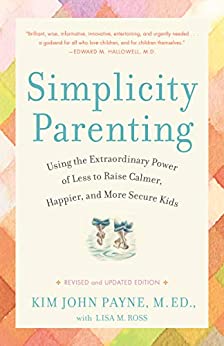More on this book
Community
Kindle Notes & Highlights
This sliding along the spectrum is really quite normal. Just as stress can push children in one direction, the reverse is also true. When you really simplify a child’s life on a number of levels, back they come.
Suzy Davies and 1 other person liked this
For children before the ages of eight or nine, you might have one or two current books accessible at any given time. A dozen or fewer beloved books may find a permanent place in the room, perhaps on a bookshelf. These are books that your child will return to again and again, and you may choose to rotate books in and out of this favorites group as your child grows.
In free play, children have to actively problem solve and to take one another’s feelings into account if the play is to be successful. Success in free play means simply that the game continues, and continues to be fun. Sometimes this problem solving is external, sometimes internal.
Children under nine certainly have feelings, but much of the time those feelings are unconscious, undifferentiated. In any kind of conflict or upset, if asked how they feel, most kids will say, very honestly, “Bad.” They feel bad. To dissect and parse that, to push and push, imagining that they are hiding a much more subtle and nuanced feeling or reply, is invasive.


